Leveraging technology to boost Vietnamese agricultural prosperity
How have technology and green production contributed to Nestlé’s success in Vietnam?
Nestlé Vietnam’s sustainable growth strategy rests upon three pillars: digital transformation, consumer-centricity innovation, and sustainable development. Consumer preferences are leaning towards innovative, eco-friendly products with low emissions and positive environmental impacts. In response, Nestlé’s green transformation agenda aims for net-zero emissions by 2050.
 |
| Le Thi Hoai Thuong, Nestlé Vietnam’s senior corporate affairs manager |
We have introduced a regenerative farming approach and initiatives to help farmers adopt low-emission practices and enhance soil health, water replenishment, and biodiversity. The company also speeds up the digitalisation process across its supply chain, involving all partners in this sustainable transformation.
The green and digital transformation boosts our sustainable development in Vietnam and enhances our competitiveness.
Nestlé has positioned Vietnam as a key coffee manufacturing hub, exporting to nearly 30 markets, including high demanding countries in Asia, Europe, and North America. Our product quality complies with strict regulations in these markets.
Since launching the NESCAFÉ Plan in 2011 in the Central Highlands, Nestlé has conducted over 355,000 training sessions on sustainable coffee farming. From 2011 to 2023, we have supported an average of more than 21,000 farming households annually.
To date, we have provided over 74 million high-quality and drought-tolerant seedlings, leading to the replanting of over 74,000 hectares of old crops.
What initiatives has Nestlé Vietnam undertaken to advance smart agriculture and digital transformation in coffee cultivation?
We acknowledge that raw materials are of utmost importance. Sustainable development is only possible when based on sustainable and responsible sources of raw materials.
The NESCAFÉ Plan in Vietnam aims to promote sustainable coffee industry practices through public-private collaboration with the Ministry of Agriculture and Rural Development and other stakeholders. The newly launched NESCAFÉ 2030 strategy builds on this with a focus on regenerative agriculture, placing farmers at its core.
Digital transformation is vital in this process. It provides farmers with tools to manage their coffee farms more effectively and to contribute to emissions reduction. This approach includes adoption of smartphones and digital tools to track the entire cultivation processes and support farmers with scientific information and updated data.
Nestlé also emphasises monitoring and evaluation, demonstrating to farmers the benefits of adhering to proper standards, which can enhance output value. Through the Agri Coffee platform, Nestlé Vietnam helps to connect farming communities, facilitating knowledge and the sharing of good practices. As of now, thousands of NESCAFÉ Plan farmers are members of this digital platform.
What challenges do businesses face in implementing these initiatives, and how has Nestlé successfully worked with farmers on projects like the NESCAFÉ Plan?
Transformation begins with a shift in mindset, followed by changes in approach across the entire chain. This process is complex and challenging, even for large companies.
Nestlé Vietnam’s dual transformation is guided by its sustainability and digital transformation committees. This approach is not about following trends but making long-term strategic investments and changes with the alignment of the company’s management team.
Key to this transformation is altering mindsets, work methods, and the ability to anticipate rapid changes, ensuring that the process is effective and not merely reactionary.
Having acknowledged that business sustainability depends on community prosperity, Nestlé formed partnerships with the MARD, researchers, and private sector including small- and medium-sized businesses to support the coffee sector’s growth. This year, Nestlé also organised training and exchanges with suppliers and transporters in Vietnam to advance net-zero goals.
What are Nestlé’s future investment plans and strategies for advancing digital transformation in the coffee industry?
Nestlé remains committed to fostering a prosperous and sustainable Vietnam. Our future investments will focus on the continuation of delivering the best quality and tasty nutritional products to Vietnamese consumers, increasing the added value of Vietnamese agricultural products, improving the livelihoods of local communities, and also making positive impacts on the environment.
We will continue to take action to advance our sustainability strategy, which underlines climate change mitigation and adaptation, responsible sourcing, sustainable packaging, and water stewardship.
These efforts will be enabled through the speeding up of digitalsation and innovation, as well as continuous investment in sustainability initiatives.
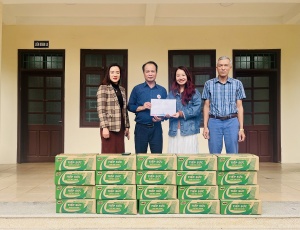 | Nestlé gives out nearly 6,000 gifts for Lunar New Year On the occasion of the Lunar New Year, Nestlé Vietnam has teamed up with several agencies and organisations to grant thousands of practical gifts to disadvantaged families and individuals in localities throughout Vietnam. |
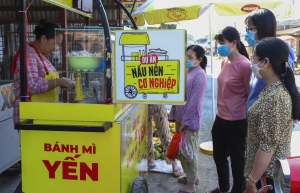 | Nestlé and Maggi campaign goes from strength to strength A campaign by Vietnam Women's Union, Nestlé Vietnam and the MAGGI brand aims to diversify opportunities to create sustainable livelihoods for women and contribute to women's empowerment. |
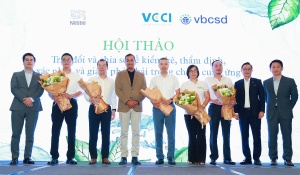 | Nestlé Vietnam promotes initiatives on emission reduction Nestlé Vietnam helped organise a workshop on April 24 to discuss greenhouse gas (GHG) inventory and initiatives to help slash emissions across the supply chain sector. |
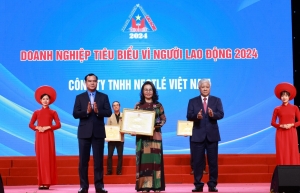 | Nestlé Vietnam recognised for labour efforts in 2024 Nestlé Vietnam has, for the fifth time, been honoured as a top enterprise for labour thanks to its efforts in building and maintaining fair and attractive human resources policies, as well as fostering a modern working environment centred around people. |
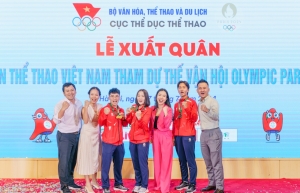 | Nestlé accompanies Vietnamese sports for Paris Olympics Nestlé Vietnam and its MILO brand on July 17 were announced as co-sponsors accompanying the Vietnamese sports delegation in a send-off ceremony for the Paris Olympics. |
What the stars mean:
★ Poor ★ ★ Promising ★★★ Good ★★★★ Very good ★★★★★ Exceptional
Related Contents
Latest News
More News
- Trung Nam-Sideros River consortium wins bid for LNG venture (January 30, 2026 | 11:16)
- Vietnam moves towards market-based fuel management with E10 rollout (January 30, 2026 | 11:10)
- Envision Energy, REE Group partner on 128MW wind projects (January 30, 2026 | 10:58)
- Vingroup consults on carbon credits for electric vehicle charging network (January 28, 2026 | 11:04)
- Bac Ai Pumped Storage Hydropower Plant to enter peak construction phase (January 27, 2026 | 08:00)
- ASEAN could scale up sustainable aviation fuel by 2050 (January 24, 2026 | 10:19)
- 64,000 hectares of sea allocated for offshore wind surveys (January 22, 2026 | 20:23)
- EVN secures financing for Quang Trach II LNG power plant (January 17, 2026 | 15:55)
- PC1 teams up with DENZAI on regional wind projects (January 16, 2026 | 21:18)
- Innovation and ESG practices drive green transition in the digital era (January 16, 2026 | 16:51)

 Tag:
Tag:




















 Mobile Version
Mobile Version